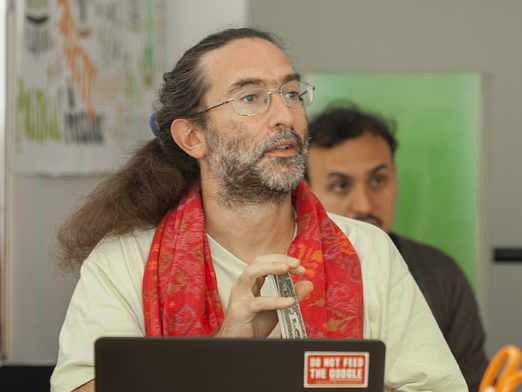
I suspected for a long time that our civilisation wasn't viable. When the banks crashed in 2008 I paid attention to a lot of apocalyptic reporting that said we came this close to economic Armageddon - whatever that meant. As I better understood how capitalism is a stupid dogma preached increasingly only by self-serving, vain sociopaths, how it requires exponential consumption of resources, and how it has failed to respond to increasingly shrill science-based warnings. I came to expect the ultimate financial collapse at any moment, or at least in my lifetime.
I was alarmed in early April 2018 when the polar vortex broke and Europe froze, but Jem Bendell's paper, Deep Adaptation: A map for navigating the climate tragedy didn't alarm me too much. His favoured theory was a multi-breadbasket failure (MBBF) within 5-10 years; the melting of sea ice at the north pole would disrupt the weather so much that that grain harvests in Russia, USA and Canada would all fail, and that this would probably lead to societal collapse. Fair enough, I said.
Jem's instincts can be uncanny. Last week I heard the news that the polar vortex has shifted over from the less cold north polar ocean to greenland, where more ice remains, and this has meant near incessant rain for grain farmers in USA. By the end of the planting season, only 60% of the fields had been planted, and much of what was planted had drowned. This plus drought in Australia and a long Russian winter means that we are facing MBBF this year.
Suddenly I'm not so sanguine. My last ten years work on complementary currencies has been an expression of optimism I didn't feel, that it was possible for people to self organise and run society differently. I felt even if there was the smallest chance of it being meaningful, in the face of such suffering, working to change the system was meaningful. Now without time to change the system, its hard to find purpose. We've been sunning ourselves on the beach until the tide went out waaaay to far, and now we see the froth of the tsunami on the horizon. Its too late to install the early warning system, too late to reinforce our houses, now we've only got time to run and to hope. Its time for me to admit that the system I was working to change for the better will be destroyed and all my work will be dashed on the rocks. Its too late to build a decentralised energy grid; too late to redesign finance; too late to build a better food system, too late to restore our national manufacturing base; too late to restore our soils, agriculture; too late for carbon capture technologies too late to dismantle the fossil fuel leviathan; too late for every hope I clung to; from last week to this, I don't know who I am any more.
Readers who knew me post-2008 may liken my anxiety then to my present anxiety. In both cases I'm right about the mechanism, and the timing is unknowable.
Climate science is far from exact, but when it starts playing out we'd be foolish to say it was wrong. But there's a leap from "crops will fail" to "society will collapse" which is another field entirely. A sensible society could still take steps (that's what Deep Adaptation is about) not so much to reduce carbon emissions but to ensure that resources are shared. But our society is very far from sensible, or even aware of what is coming. A real but manageable hunger crisis, perhaps comparable to the special period in Cuba, will be compounded by shock, blame, #ClimateGrief, and opportunist elites profiting from pain.
So this winter the global grain reserves will be eaten and as in 2011, the poorer countries will probably experience political unrest fueled by high food prices. Since the north pole is past its tipping point, next year will almost certainly be worse than this, so about 18 months from now, a LOT of people will be freaking out. More than ever before, the food we eat will be taken directly out of the mouths of the starving.
Some people are predicting human extinction, but that seems a rather abstract loss to me. My chest is heavy and my gaze constantly drifts because I'm grieving the failure of our wondrous civilisation, contemplating the expansion of needless suffering, and turning to face a difficult future.
It is easy to be fearful of the future which is unknown by definition. But in this case we know a lot - we just don't spend much time joining the dots. Perhaps I'll outline my thoughts another time - if its not too late!

Comments3
Hi Paul,
Hi Paul,
I have known about these "likely" outcomes for quite some time now and also believe that we are many decades too late to apply the solutions that people - still in denial - are talking about now.
If you want my emotional-support, I certainly appreciate yours in return!
Thanks,
Martin.
This is fabulous, Matt..
This is fabulous, Matt...truly fabulous!!
Yes, you are perfect for the "Post-Doom" series! We look forward to our call.
~ Michael
It is more likely to expect
It is more likely to expect catastrophic decline in human populations, especially in vulnerable areas than NTHE.
Some will live on to rebuild sustainably, chastened by lessons of the near future.
Whether we do something now, and only hundreds of millions die by century's end, or nothing and billions die is not for me to decide today.
I can only trudge resolutely toward a dimly perceived post-apocalyptic green renaissance.